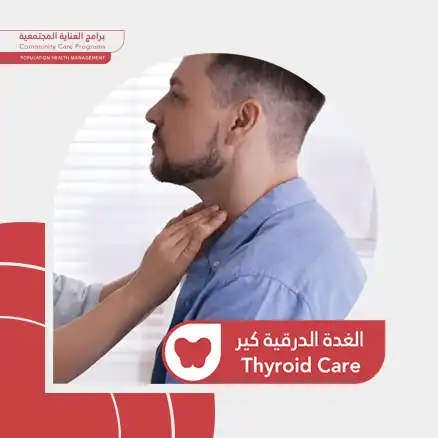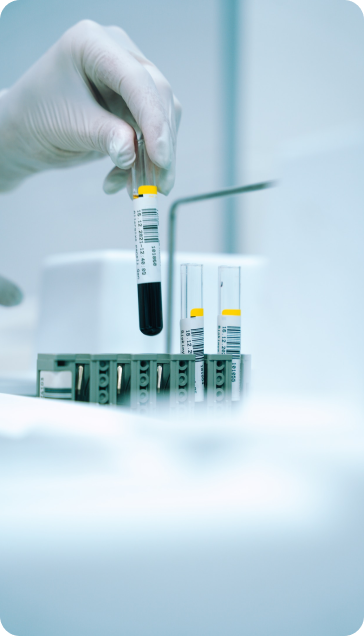
Al Borg Diagnostics
Thyroid Disease
What are thyroid diseases and who do they affect?
When the thyroid gland produces too much hormones, the body uses energy faster than it should in a condition called hyperthyroidism. When the thyroid gland does not produce enough hormones, the body uses energy more slowly than it should, a condition called hypothyroidism. The reasons that lead to the development of these two conditions vary, as people of different ages and races may develop thyroid diseases, knowing that women are five to eight times more likely to develop thyroid disease than men.
What are the causes of thyroid disease?
There are many different causes of thyroid disease, and the following factors cause hypothyroidism:
• Thyroiditis, or inflammation of the thyroid gland, which may reduce the amount of hormones produced.
• Chronic immune thyroiditis, or what is known as Hashimoto’s disease, is a painless disease.
• Iodine deficiency, and this problem has been virtually eliminated thanks to the use of iodized salt.
• One out of every four thousand births suffer from an underactive thyroid gland, and if this problem is not treated, he will suffer from physical and mental retardation.
Causes of hyperthyroidism:
• Graves’ disease is the most common cause of hyperthyroidism; the immune system produces an antibody that stimulates the thyroid gland to produce too much thyroid hormone.
• One or more thyroid nodules (small growths or lumps in the thyroid gland) can produce too much thyroid hormone.
• Subacute (granulomatous) thyroiditis is thought to be caused by a virus. It causes a painful, tender, enlarged thyroid gland.
• Taking too much thyroid hormone medication for hypothyroidism increases blood levels into the range seen in patients with hyperthyroidism.
Postpartum thyroiditis, which affects 9-5% of women after childbirth, is often a temporary condition.
can occur several months after delivery. The hyperthyroid symptoms may last for several months, often followed by several months of hypothyroid symptoms.
What are the symptoms of hypothyroidism and hyperthyroidism?
Symptoms of hypothyroidism are:
• Feeling tired, frequent and heavy menstruation, forgetfulness and weight gain.
• Dry hair, rough skin, hoarseness, and cold intolerance. Symptoms caused by hyperthyroidism:
• Feeling agitated and nervous. Muscle weakness and tremors.
• Irregular menstruation in women. weight loss.
• Sleep disorders
• Goiter; thyroid gland enlargement
• Vision problems or eye irritation. Inability to tolerate heat.
How is thyroid disease diagnosed?
Thyroid diseases are sometimes difficult to diagnose, because it is easy to confuse their symptoms with other conditions. Fortunately, there is a test called the thyroid-stimulating hormone (TSH) test, through which thyroid diseases can be diagnosed even before symptoms appear, and when the disease is diagnosed early, treatment is possible. Free thyroid hormone 3 (FT3), and free thyroid hormone 4 (FT4) are also used for diagnosis.
Check your Thyroid Health With Thyroid Care




